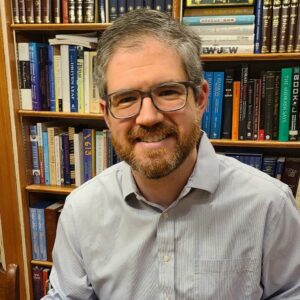
By Rabbi Alex Salzberg
The reconciliation between Joseph and his brothers is one of the most powerful moments in all of Torah. We often focus on Judah’s words to understand what has changed to allow these estranged siblings to rebuild their relationship after so many years and so much pain.
More important than Judah’s words, are his actions. I believe that what impacted Joseph appeared in the opening word of the portion: Vayigash, or “Judah approached.” Throughout Joseph’s childhood, his brothers refused to speak to him. Rather than talking to Joseph about his dreams, they decided to act, throwing him in a pit and then selling him into slavery. Rather than reaching out, they turned inward and plotted a solution to their problem that rejected the possibility of a life with Joseph. They never considered that people and relationships can change.
Here, Judah is different. He approached Joseph. Our sages disagree about the manner in which Judah approached Joseph. One argues that “approach” in this sense means to be conciliatory. Another proposed that Vayigash is the language of prayer. A third says that Judah approached Joseph prepared for battle.
Judah’s motivation and attitude are not clear, but what is clear is the way that Joseph experienced it. Immediately after Judah’s speech, Joseph sends the servants away, and reveals himself to his brothers. He is so overcome with emotion that Pharaoh’s entire household could hear him crying. Joseph experiences something that he never had before: one of his brothers engaging with him and seeking a relationship.
It is the very fact that Judah approached that made Joseph willing to unmask himself.
Indeed, there is one final interpretation of the word Vayigash and Judah’s actions here that drives home this point. Rabbi Yehudah declares that Vayigash is the language of love. Joseph finally saw the possibility of the brotherly love that he had lacked as a child. He was overwhelmed by all that he had lost and all that was suddenly returned to him in that moment.
Over the past two-and-a-half months, I — and my community — have often felt alone on campus. We have cared for one another and received incredible support from the wider Jewish world. But over and over again, students and faculty at Towson University have shared how disheartened they have been by the lack of outreach and concern from non-Jewish friends and colleagues. These are not individuals who hold strong anti-Israel beliefs, simply people who are not attuned to the pain and isolation that our community is feeling in this moment.
In the same breath that these friends share their disappointment, they have also shared how meaningful it has been when friends, colleagues and acquaintances have checked in. Members of the TU administration have regularly checked in on our community’s well-being. Such presence and care are more meaningful than ever. My heart is warmed every time I recall how, on Oct. 13, as I was taking down my sukkah, someone that I had never met before stopped his car in front of my house to ask how I was doing, how my people were doing, and to tell me that we are in his prayers.
May we all experience the comfort and reassurance that comes from presence and from love. May we all feel the support of those who care for us in the wider world. And may we offer this care and presence to those in our lives who need it as well.
Rabbi Alex Salzberg is a Baltimore native and a graduate of Krieger Schechter Day School and Pikesville High School. He has a master’s degree from Towson University and is the executive director of Towson University Hillel.





